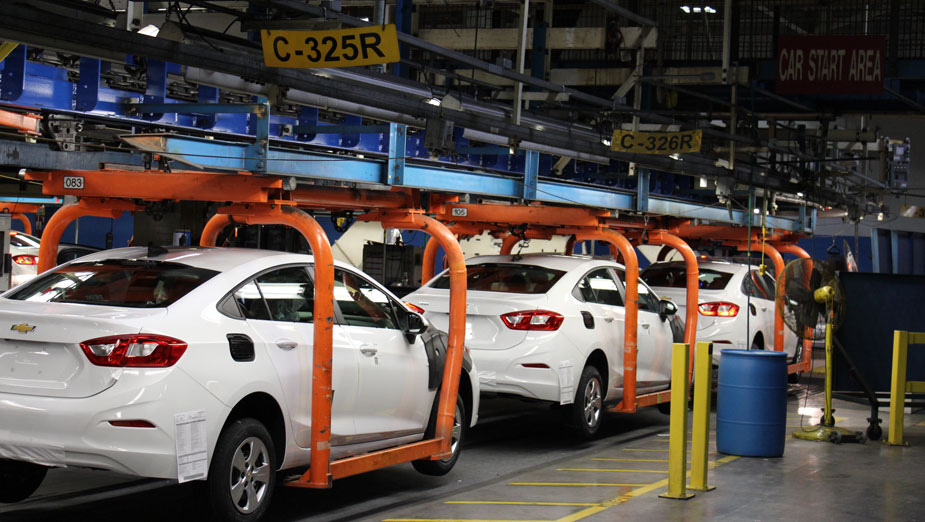Ohio AG Urges Tax Authority to Vote on GM Decision
YOUNGSTOWN, Ohio – Ohio Attorney General David Yost says he’s not happy with the Ohio Tax Credit Authority’s decision to postpone a vote on whether General Motors should repay the state more than $60 million for violating incentives agreements the company secured more than a decade ago.
“I’m extremely disappointed,” Yost said today during an interview with The Business Journal. “It was our understanding as of Friday that they were going to make a decision.”
The tax credit authority opted on Monday to delay a vote on whether GM should pay back $60.3 million in tax credits it received in 2009 in order to retool its Lordstown plant. In exchange for the incentives, GM pledged to maintain employment at the Lordstown site until 2040.
GM shut down its Lordstown plant in March 2019, eliminating 1,600 jobs. It officially closed the factory later that year and sold it to electric-vehicle startup Lordstown Motors Corp.
“It’s clear cut,” Yost said. “They took the tax credits, then they took the jobs.”
Regulators also tabled a measure to consider new tax credit incentives for Ultium Cells LLC, a joint venture between GM and LG Chem that is building a $2.3 billion electric-vehicle battery manufacturing plant in Lordstown.
Yost initially thought the matter would be addressed at the tax authority’s meeting in July. The timetable prompted Yost’s office to file on June 30 an amicus brief before the tax authority, demanding that it hold GM accountable for the entire amount.
The tax authority did not take the issue up at the July meeting.
“We’ve never had an attorney general file such a brief,” Yost said, noting that this is a particularly unusual case. “We filed it on behalf of the people of Ohio.”
Other elected officials, including U.S. Sens. Sherrod Brown, a Democrat, and Republican Rob Portman, have said that GM should pay the state back. Former Ohio governor Ted Strickland also says that the state should collect in full from GM.
“I absolutely think the state should go after that,” Strickland told The Business Journal. “A commitment is a commitment.”
Yost’s brief urges the Ohio Tax Credit Authority to demand a 100% repayment from GM. Anything short of this constitutes a “moral hazard of saddling Ohio taxpayers with GM’s business risk,” according to the brief.
In June, The Business Journal and ProPublica first reported that the state of Ohio placed GM on notice in March that it violated the terms of two tax-credit agreements worth $60.3 million when it closed its Lordstown manufacturing plant in 2019. In a letter to GM, the state’s Development Services Agency considered recommending to the tax credit authority that it seek 100% restitution from GM for violating the terms of incentives agreements.
GM has said that it shouldn’t repay those incentives, or at least a substantial portion of them, according to documents obtained by The Business Journal and ProPublica.
The automaker cited deteriorating market conditions in the small car segment as a major factor in closing the plant, which at the time produced the Chevrolet Cruze.
In addition, GM emphasized that the state should consider its $2.3 billion investment in building the new Ultium plant in Lordstown, its other operations in Ohio, and that it far exceeded its investment in the Lordstown plant while it was operating.
The state in 2009 awarded two incentives agreements to GM – a job creation tax credit agreement worth $14.2 million and a job retention tax credit deal worth $46.1 million.
According to Yost’s filing, GM initiated a pattern of breaking its promise to the state in January 2017 when it eliminated an entire production shift at Lordstown, cutting 1,200 jobs. A second shift was slashed in July 2018, eliminating another 1,500 jobs. The remaining 1,600 hourly and salaried employees were cut when the last Cruze rolled off the line in March 2019.
His brief emphasized that GM “had no valid excuse or argument” to deflect its responsibility to Ohio taxpayers.
Should the tax credit authority mandate that GM repay its full liability and the company refuse to honor the demand, then “the attorney general is prepared to enforce the matter in court,” the brief said.
“Profit, it has long been said, is not a dirty word in Ohio,” Yost’s brief continued. “But a broken promise is.”
But Yost added that continuing to delay a vote or decision on the matter is not in Ohio’s best interests.
“What is a contract worth when you can’t enforce it?” he told The Business Journal Monday. Allowing GM to skirt its obligations encourages others to treat Ohio “as the first debt to walk away from.”
The next meeting of the tax authority is scheduled for Sept. 28.
“This issue is overripe for a decision,” he said.
Related coverage:
Aug. 31: Tax Authority Postpones Action on GM Incentives
July 27: Tax Credit Authority Won’t Address GM’s $60M Tax Liability Until Aug. 31
June 30: Yost Demands GM Repay $60M in Tax Credits for Lordstown Plant
June 24: DeWine: Ohio ‘Not Actively Pursuing’ $60M Clawback from GM for Lordstown Closure
June 15: Exclusive: Ohio Seeks $60M from GM for Closing Lordstown Plant
Copyright 2024 The Business Journal, Youngstown, Ohio.



